Related Research Articles

"Making Your Mind Up" is a song by the British pop group Bucks Fizz. It was the winner of the 1981 Eurovision Song Contest, representing the United Kingdom, and was composed by Andy Hill and John Danter. Released in March 1981, it was Bucks Fizz's debut single, the group having been formed just two months earlier. Following its win in the contest, the song reached No. 1 in the UK and several other countries, eventually selling in excess of four million copies. It launched the career of the group, who went on to become one of the biggest selling acts of the 1980s and featured on their debut, self-titled album.

Teach-In was a Dutch band, best known for winning Eurovision Song Contest 1975 with the song "Ding-a-dong". The band was founded in 1967 and parted in 1980. Throughout this time there were several changes in line-up.
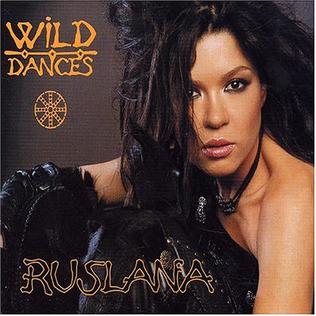
"Wild Dances" is a single by Ukrainian singer-songwriter Ruslana. The song, representing her country, won the Eurovision Song Contest 2004 held in Istanbul with a score of 280 points. A Ukrainian-language version called "Dyki tantsi" was released in Russia and Ukraine.

Gigliola Cinquetti is an Italian singer, songwriter, and television presenter.
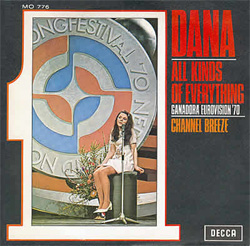
"All Kinds of Everything" is a song written by Derry Lindsay and Jackie Smith; as performed by Dana, it won the Eurovision Song Contest 1970 representing Ireland. "All Kinds of Everything" marked a return to the ballad form from the more energetic performances which had dominated Eurovision the previous years. Dana sings about all the things which remind her of her sweetheart with the admission at the end of every verse that "all kinds of everything remind me of you". The recording by Dana became an international hit.
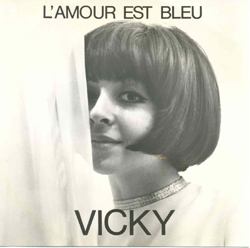
"L'amour est bleu" is a song whose music was composed by André Popp, and whose lyrics were written by Pierre Cour, in 1967. Bryan Blackburn later wrote English-language lyrics for it. First performed in French by Greek singer Vicky Leandros as the Luxembourgish entry in the Eurovision Song Contest 1967, it has since been recorded by many other musicians, most notably French orchestra leader Paul Mauriat, whose familiar instrumental version became the first number-one hit by a French lead artist to top the Billboard Hot 100 in America.

"What's Another Year" was Irish singer and composer Johnny Logan's first Eurovision Song Contest winning song, achieving success in the 1980 edition of the contest, as well as Ireland's second Eurovision victory. Composed by Shay Healy, the song reached number one in the UK Singles Chart for two weeks in May.

"Ein bißchen Frieden" is a German-language song, written by prolific German Eurovision-writing duo Ralph Siegel (music) and Bernd Meinunger (lyrics) for the Eurovision Song Contest 1982, held in Harrogate, United Kingdom. It was performed by 17-year-old German high-school student Nicole Hohloch, resulting in Germany's first win at the Eurovision Song Contest by a record margin of 61 points, setting a new record for the largest winning margin that lasted until the Eurovision Song Contest 1997. Nicole's single is still the only Eurovision entry to top the sales charts in every territory it was released in.

"The Voice" is a song by Irish singer Eimear Quinn that was the winner of the Eurovision Song Contest 1996, representing Ireland. The music was composed, and the lyrics were written, by Brendan Graham, who had also written and composed "Rock 'n' Roll Kids", the Irish winner from the 1994 contest. The victory, which was Ireland's fourth in five years, was their seventh contest victory, which remains a record for the most contests won by a single country.

"Non ho l'età ", usually given as just "Non ho l'età", was the winning song in the Eurovision Song Contest 1964, held in Copenhagen. It was performed in Italian by Gigliola Cinquetti representing Italy. Like all previous Italian Eurovision entries, the song had also won that year's Sanremo Music Festival. Cinquetti was sixteen years old, making her the youngest Eurovision winner in history until 1986 when Belgium's Sandra Kim won the contest with "J'aime la vie" – initially claiming to be fifteen, it was later revealed that Kim was only thirteen. In 1990, the EBU made a new rule requiring contestants to be aged 16 or older before the contest; this age rule still operates.
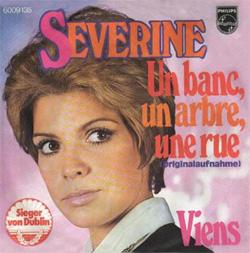
"Un banc, un arbre, une rue" was the winning song of the Eurovision Song Contest 1971 performed in French by French singer Séverine, representing Monaco.

"Congratulations" is a song recorded by British singer Cliff Richard. The song was written by Bill Martin and Phil Coulter. It is best known as the British entry at the Eurovision Song Contest 1968, held in London finishing in second place behind the Spanish entry. The song went on to reach number 1 in many countries including Spain.

"Croire" is a song performed in French by Belgian singer Lara Fabian, written by Alain Garcia and composed by Jacques Cardona. The song is Luxembourg's entry in the Eurovision Song Contest 1988, and became a hit in Europe selling nearly 500,000 copies.

"L'Amour s'en va" is a song created and performed by French singer-songwriter and actress Françoise Hardy. The song is Monaco's representative in the Eurovision Song Contest 1963, covered in other languages, and in 1963 gained chart success in Belgium and won France's prestigious award Grand Prix du Disque. Some fifty years after its original release the song holds as one of Hardy's signature tunes.
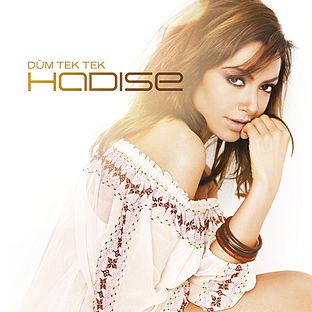
"Düm Tek Tek" is a song by Belgian-Turkish singer Hadise that was performed as the Turkish entry for the Eurovision Song Contest 2009 in Moscow, Russia.

"Rock Bottom" was the British entry in the Eurovision Song Contest 1977, performed in English by Lynsey de Paul and Mike Moran. It was also written and produced by de Paul and Moran and released on the Polydor record label. Originally it was written for the group Blue Mink; and submitted unbeknown to de Paul and Moran as an entry for A Song For Europe by the publishers and when it was selected, de Paul agreed to perform the song if Moran would join her. On 9 March 1977, "Rock Bottom" was selected to represent the UK at the A Song for Europe 1977 event held at the New London Theatre, presented by Terry Wogan.
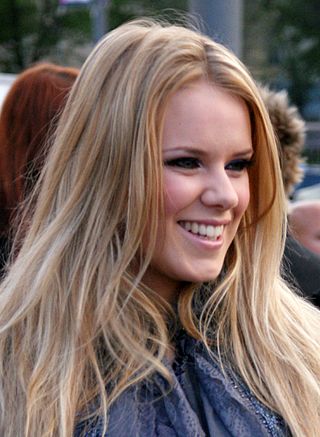
Jóhanna Guðrún Jónsdóttir, known outside Iceland as Yohanna, is an Icelandic-Danish singer. Beginning her music career as a child singer, Yohanna received international recognition after representing Iceland in the Eurovision Song Contest 2009 with the song "Is It True?", placing as the runner-up. This tied for the best result Iceland had ever achieved in the contest. Following the success at Eurovision, she released the studio album Butterflies and Elvis (2009).
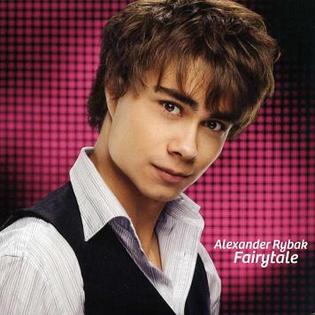
"Fairytale" is a song written and performed by Belarusian-Norwegian violinist and singer Alexander Rybak. It is the first single from his debut album Fairytales. The song was the winner of the Eurovision Song Contest 2009, where he represented Norway.

"Everyway That I Can" is the winning song of the Eurovision Song Contest 2003 sung in English by Sertab Erener for Turkey. The song was written by Demir Demirkan in early 2003 and produced and arranged by Ozan Çolakoğlu, famous for his works with pop idol Tarkan. Initially, it sparked controversy in Turkey for its subject matter and English-language lyrics, and was not considered a favorite to win the contest.

"J'ai cherché" is a song performed by French-Israeli singer Amir Haddad. The song represented France in the Eurovision Song Contest 2016 in Stockholm, Sweden. The song finished 6th overall in the grand final, with 257 points, finishing 3rd with the juries and 9th in the televote, France's best result since 2002. It was written by Haddad along with Johan Errami and Nazim Khaled, while Khaled produced the track along with Silvio Lisbonne and Skydancers. The song was released as a digital download on 15 January 2016 through Sash Productions. The song was released as the second single from his second studio album Au cœur de moi (2016).